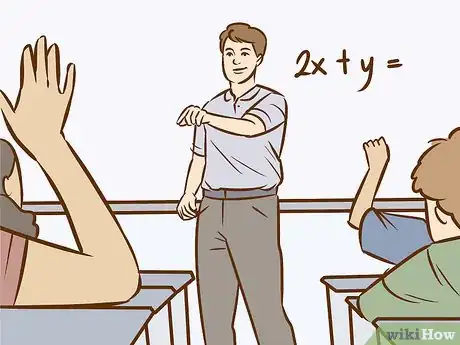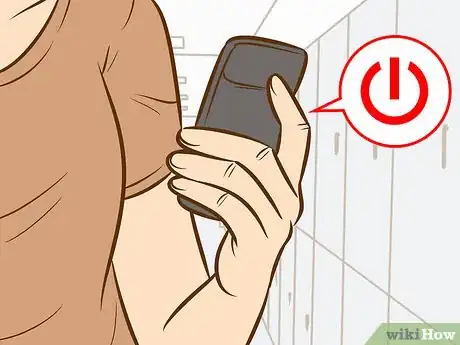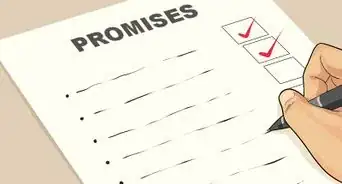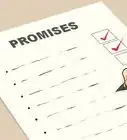This article was co-authored by Josh Jones and by wikiHow staff writer, Amber Crain. Josh Jones is the CEO and Founder of Test Prep Unlimited, a GMAT prep tutoring service. Josh built the world's first and only score guarantee program for private GMAT tutoring. He has presented at the QS World MBA Tour and designed math curricula for Chicago Public Schools. He has over 15 years of private tutoring and classroom teaching experience and a BA in Math from the University of Chicago.
wikiHow marks an article as reader-approved once it receives enough positive feedback. In this case, several readers have written to tell us that this article was helpful to them, earning it our reader-approved status.
This article has been viewed 244,219 times.
Dull classes can be a challenge to endure! Many students struggle with paying attention when they’re bored, so you’re not alone. In fact, you’ve already taken a huge first step just by coming to this article. It shows that you’re motivated to learn and ready to tackle this issue. Now that you're motivated, there are a lot of great techniques you can try to keep yourself engaged in class. Some of them are even fun!
Steps
Motivating Yourself
-
1Create small goals and mini-rewards to go with them. For example, tell yourself that if you pay attention for the next 15 minutes, you can have a few peanut M&Ms from the bag you’ve stashed in your backpack. For every additional 15 minutes, you get a couple more. Or, instead of M&Ms, you can allow yourself to check your phone briefly.[1]
- You could also tell yourself that if you take good notes through the entire class, you can play your new video game for an hour when you get home.
-
2Choose a reward you can have right after class. This can be a good motivator if you have trouble making it through the whole class, or if the class is pretty long. After all, if it’s a 3-hour class, you will probably get tired of eating M&Ms or checking your phone for updates.[2]
- For example, before walking into Physics today, tell yourself that if you pay attention the entire time, you can grab your favorite mocha latte or hit the arcade right after class.
Advertisement -
3Treat yourself to something that has a connection to the class. For example, maybe you find French class excruciatingly boring. Hey, you’re not the first person to feel that way! Tell yourself that if you pay attention today, you’ll treat yourself to that cool new French film (sub-titled, of course!) you’ve been wanting to see downtown. Or you can treat yourself to a delicious croissant or éclair after class.[3]
- After paying attention in class and scarfing down an éclair, you'll probably be feeling pretty good. See? Maybe French isn’t so bad after all.
- Doing this helps you associate positive things with your class. In turn, this may encourage you to pay attention more.
-
4Get in the right mindset before walking into class.[4] If you walk into class already dreading how boring it's going to be and telling yourself that paying attention is going to be impossible, you won't feel very motivated to stay on track. Instead, walk in telling yourself that you will succeed at paying attention in today's class. Set your mind to achieving your goal![5]
- For example, instead of thinking "Ugh, I hate this class! It's so boring," you could think: "Maybe I'll learn something interesting today."
-
5Ask a friend to help you stay on track. If you have a friend in the class, ask them to discreetly let you know when your mind has clearly wandered. They can tap you on the shoulder once, or something else subtle, to help you refocus on the lecture.[6]
- A friend can help you hold yourself accountable to your goal of paying better attention during class.
- If you don't have any friends in that class, ask a trusted classmate that you get along with well instead.
-
6Don’t beat yourself up if you still have trouble paying attention. You’re not perfect – in fact, no one is! Maybe today in class you drifted off a few times, stopped paying attention completely, or even fell asleep for most of it. It happens to everyone occasionally, so don’t beat yourself up. Just tell yourself that tomorrow will be different, and keep trying.
Keeping Yourself Occupied
-
1Sit near the front of the class. If your class has assigned seats, this may not be an option. But if you get to choose your seat each time you go to class, try picking one near the front. With your teacher that close to you, you might find it a little easier to pay attention. This might not be the most pleasant solution, but it can be really effective. You can even try and ask questions even if you know the answers! [7]
- If your class has assigned seating, ask your teacher after class about moving. Be upfront and tell them you want to move because you’re having trouble staying focused.
-
2Squeeze a stress ball or bring a fidget spinner. Fidgeting and squeezing a ball might not sound very motivating right now, but give it a try! It actually helps a lot of people, because it gives them something to do with their hands while they sit in class. You can just squeeze it whenever you feel like it, or make it into a game.[8]
- For instance, you could squeeze the ball every time your Algebra teacher says “equation.” It's not the most thrilling game, but it will keep you tuned into the lecture!
- Some schools don't allow fidget spinners so find out your school's policy on them before bringing one in.
- Other great fidget devices include kneaded erasers and fidget boxes. The latter consists of a small cube, filled with buttons, switches, and scrolls.
-
3Change something up for a quick mental reboot. As soon as you start drifting off, make yourself do something small, like grab a new pen from your bag, do some neck rolls, or cross your other leg.[9]
- These little actions may not seem like much, but they can help your brain reboot when you feel your concentration slipping.
-
4Take good (but entertaining) notes. Even if the subject matter is boring, your notes don’t have to be! Try visual notetaking, which is basically drawing images and diagrams instead of writing words. Or you could take down notes in a humorous tone, like you were telling a story to your best friend rather than jotting down boring facts.[10]
- For example, say your teacher is droning on about Benjamin Franklin's exploration of electricity. Your notes could say: “So Ben got the bright idea to tie a metal key to a kite string. Then made his own son fly the kite in a thunderstorm! Poor kid was a sitting duck. He was allowed to stand in a doorway to stay dry while waiting to get zapped, so there’s that.”
- Taking entertaining notes may even help you remember the material better!
-
5Participate in class. It can be hard to pay attention in a boring class, but try to make yourself participate by asking and answering questions or joining in on group discussions. For example, challenge yourself to ask at least 3 questions or contribute 3 discussion statements per class.[11]
- Not only will this help you focus on the lecture, but it may help you score a few extra participation points.
Removing Distractions
-
1Use the restroom before class begins. It’s difficult to pay attention when you have to use the bathroom, so make a stop there before class starts. Of course, you can’t always control when nature calls! But hitting the bathroom before class can at least help you control the issue to some extent.
- If nature does come calling and becomes a major distraction, don’t torture yourself! Raise your hand and ask for permission to go.
- While you’re in there, splash a little cool water on your face. It can help you feel refreshed before returning to your desk.
-
2Turn off your cell phone and put it out of reach. It’s easy to feel bored when there are other things you’d rather do, like texting with your friends or checking your Facebook feed. By turning off your phone and storing it away in your bag or desk, you won’t feel as tempted to sneak a peek and divert your attention from class.[12]
- Rather than just stuffing it inside your bag or desk, put it into a pencil case or zippered pouch. The extra effort of getting it out may help further deter you.
-
3Bring a snack or eat one right before class. Hunger is distracting! Your teacher is talking about the War of 1812, and you’re seeing pizza slices dancing in front of your eyes. If your stomach starts to audibly growl, that’s even worse!
- If your teacher allows food in the classroom, bring a snack with you. If your teacher doesn’t allow food, grab a snack right before class to keep hunger pains at bay.
- Avoid noisy snacks, like crunchy potato chips, as this can distract other students. If you're sneaking food in, it might get you caught.
- If it’s a morning class, treat yourself to a good breakfast before you head in.[13]
Expert Q&A
Did you know you can get expert answers for this article?
Unlock expert answers by supporting wikiHow
-
QuestionHow can I stay focused in a boring class?
 Josh JonesJosh Jones is the CEO and Founder of Test Prep Unlimited, a GMAT prep tutoring service. Josh built the world's first and only score guarantee program for private GMAT tutoring. He has presented at the QS World MBA Tour and designed math curricula for Chicago Public Schools. He has over 15 years of private tutoring and classroom teaching experience and a BA in Math from the University of Chicago.
Josh JonesJosh Jones is the CEO and Founder of Test Prep Unlimited, a GMAT prep tutoring service. Josh built the world's first and only score guarantee program for private GMAT tutoring. He has presented at the QS World MBA Tour and designed math curricula for Chicago Public Schools. He has over 15 years of private tutoring and classroom teaching experience and a BA in Math from the University of Chicago.
CEO, Test Prep Unlimited
-
QuestionWhat if you already know what your teacher is teaching in class?
 Community AnswerIf you know what the teacher is teaching, then try to challenge yourself and the class. Ask a question that was never covered, challenge the teacher or author's viewpoint, or try to add some new information that the book doesn't cover. A challenged student is an engaged one, so try to find a way to keep learning even it seems like there is nothing to learn. Tutoring or helping others is another good strategy.
Community AnswerIf you know what the teacher is teaching, then try to challenge yourself and the class. Ask a question that was never covered, challenge the teacher or author's viewpoint, or try to add some new information that the book doesn't cover. A challenged student is an engaged one, so try to find a way to keep learning even it seems like there is nothing to learn. Tutoring or helping others is another good strategy.
References
- ↑ https://www.thoughtco.com/how-to-concentrate-in-class-3212044
- ↑ https://www.thoughtco.com/how-to-concentrate-in-class-3212044
- ↑ https://www.fastcompany.com/3027855/10-ways-to-reward-yourself-for-working-so-hard
- ↑ Josh Jones. Academic Tutor. Expert Interview. 15 November 2019.
- ↑ http://www.huffingtonpost.com/alicia/accountability-goals_b_7845608.html
- ↑ http://www.huffingtonpost.com/alicia/accountability-goals_b_7845608.html
- ↑ https://www.thoughtco.com/how-to-concentrate-in-class-3212044
- ↑ https://www.theatlantic.com/business/archive/2015/07/stress-toys-focus-work/398453/
- ↑ https://www.thoughtco.com/how-to-concentrate-in-class-3212044
- ↑ http://blog.iat.com/2015/08/26/the-best-note-taking-strategies-for-students-teachers-and-experts-weigh-in/
- ↑ https://www.thoughtco.com/how-to-concentrate-in-class-3212044
- ↑ https://www.thoughtco.com/how-to-concentrate-in-class-3212044
- ↑ https://www.thoughtco.com/how-to-concentrate-in-class-3212044











































































